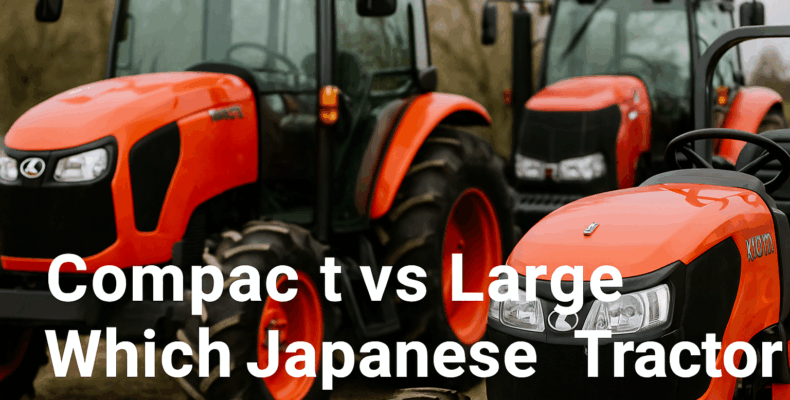When exploring Japanese tractors, understanding the differences between compact and large models is crucial. Each type serves specific purposes and offers unique benefits. For global buyers, making the right choice can lead to improved efficiency, better returns, and long-term satisfaction.
In this article, we compare the features, uses, and benefits of compact versus large Japanese tractors, helping you determine the best fit for your agricultural needs.
Why Japanese Tractors Dominate Global Markets
Japanese tractors have earned a stellar reputation for reliability, fuel efficiency, and cutting-edge engineering. Brands like Kubota, Yanmar, Iseki, and Mitsubishi have supplied thousands of quality units to farmers in Africa, Southeast Asia, Australia, and beyond.
Moreover, Japanese tractors are designed for both precision tasks and heavy-duty operations, making them ideal for diverse farming environments.
Compact Japanese Tractors: Built for Precision and Versatility
Compact tractors are small, lightweight, and fuel-efficient. These machines are perfect for small-scale farms, landscaping, orchards, and even greenhouses. Although compact in size, they often come with features like 4WD, power steering, and multiple PTO speeds.
Key Advantages of Compact Tractors:
-
Easy to maneuver in tight spaces
-
Ideal for narrow rows or small plots
-
Lower initial and maintenance costs
-
Simplified operation for new users
-
Transportable on small trailers
Common Uses:
-
Tilling and plowing
-
Mowing and weed control
-
Hauling lightweight materials
-
Cultivating vegetables and fruits
For instance, the Kubota B series and Yanmar AF models offer superior performance while maintaining affordability and ease of use.
Large Japanese Tractors: Designed for Power and Heavy Work
In contrast, large tractors are engineered for high horsepower and strength. These machines are suitable for expansive fields, mechanized farms, and operations that demand powerful tilling or harvesting attachments.
Key Benefits of Large Tractors:
-
High torque for tough jobs
-
Capable of pulling large implements
-
Faster field coverage
-
Greater lifting and PTO capacity
-
Robust transmission systems
Typical Applications:
-
Heavy plowing
-
Rice or wheat cultivation
-
Commercial-scale operations
-
Transport of heavy loads
Models like the Kubota M series and Iseki TJ series fall under this category and are known for their durability and field performance.
How to Decide Between Compact and Large Tractors
Choosing between compact and large tractors depends largely on your farm’s size, soil type, crop variety, and available budget.
✅ If you manage a small or urban farm, a compact tractor is likely more practical.
✅ For large farms with vast land, stronger machinery is essential to keep up with operational demands.
Additionally, maintenance access and spare parts availability in your country should influence your purchase decision.
Where to Buy Reliable Japanese Tractors
Now that you know the differences, the next step is finding a trusted exporter. Thankfully, the Japanese market has some of the most reputable used tractor suppliers in the world.
👉 Top 5 Trusted Japanese Used Truck Exporters for Global Buyers
This guide lists exporters who handle not just trucks, but also high-quality used Japanese tractors. These exporters offer:
-
Detailed inspection reports
-
Smooth international shipping
-
Competitive pricing
Final Thoughts
Whether you choose a compact or large tractor, Japanese models offer durability, versatility, and value. With proper selection and support from a trusted exporter, your investment can enhance your farm’s productivity for years.
So, explore your options, define your needs, and let a reliable Japanese tractor power your agricultural journey!
